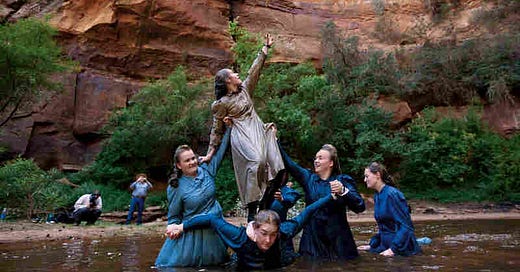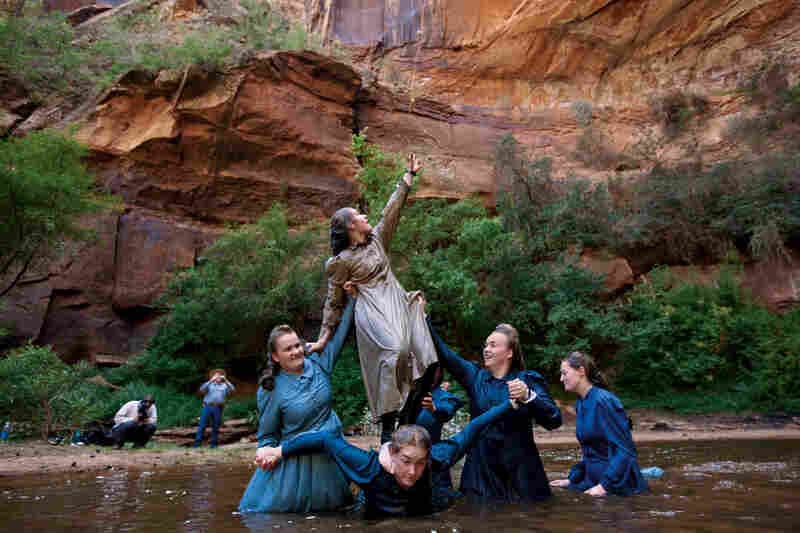Can't Keep Sweet: The Unstoppable Force of Women's Voices
What two FLDS cult survivors taught me about resistance and resilience.
Rebecca Musser walked into the courtroom wearing a bright red dress—the color of defiance. She was ready to testify against Warren Jeffs, the man who had controlled her since she was a teenager.
Elissa Wall sat in that same courtroom, reliving the trauma of being forced into marriage as a child. She had been taught obedience was survival. But now, her voice carried the weight of justice.
Neither of them were raised for this kind of moment. They weren’t supposed to be there. They were supposed to be silent. I can imagine they were trembling, tired, and terrified.
How did they get here? Well, the Fundamentalist Church of Jesus Christ of Latter-Day Saints (FLDS) broke off from mainstream Mormonism in the early 1900s to preserve polygamy, a core tenet of their faith.
Their Prophet Warren Jeffs, controlled everything: marriages, homes, businesses, schools, law enforcement. He was the authority.
Rebecca was a plural wife and had been married to the previous prophet, Rulon Jeffs, who was Warren’s father. When Rebecca found out she’d have to get remarried to Warren after Rulon died, she ran for her life.
Elissa, her younger sister, was forced by Jeffs to marry her older cousin when she was only 14. The marriage was characterized by abuse, and no matter how hard she tried, she couldn’t leave for years.




Warren Jeffs had about 87 wives, and 24 of them were underage. He became a notorious fugitive on the FBI’s top ten most wanted list.
Hence the courthouse. The red dress. The urgent need to testify. The media hayday.
And up until that point, Elissa and Rebecca had been taught one main message:
Keep Sweet.
That phrase was more than a motto in the FLDS. It was a sugarcoated demand. It meant no questioning, no complaining, no anger. It meant a woman’s voice should be soft. It meant swallowing fear, pain, and even abuse.
When I watched the documentary Keep Sweet, Pray, and Obey on Netflix, I noticed eerie phantom-like parallels between their world and the Independent Fundamental Baptist (IFB) world I was born into.
Not everything was the same, and the FLDS women endure a very distinct suffering. But as I watched the documentary, the patterns felt familiar enough to send ripples of anxiety through my chest. The policing of emotions. The use of catchy phrases and slogans. The quiet, ever-present expectation to make yourself small. The hierarchical teachings that put men in charge of women.
We never said the words keep sweet. But we had our own versions of it. Have a meek and quiet spirit. Be a helpmeet. Don’t be a stumbling block. Biblical womanhood.
The women of the FLDS fascinated me. Beyond their pastel dresses, intricate braids, and Mona Lisa smiles, there was one thing in particular that wrecked me.
Their voices.
Soft. Airy. Shiny. Effervescent bubbles, floating up to a high pitch and then dissipating before they could even take up space.
I knew this wasn’t just an FLDS quirk. Later, I’d find the work of writer Tia Levings, who calls it Fundie Baby Voice—a trained vocal trauma response.
Tia made connections I’d never heard before. Like how this concept comes from Helen Andelin’s Fascinating Womanhood, a book that gained popularity among Mormon and Christian communities in the 1960s and 70s. (I won’t link it as a source—because, ew.)
Here’s the quote Tia pulled to show how Fascinating Womanhood taught Fundie Baby Voice. I dare you to read this in the brightest, bubbliest tone possible without your soul trying to leave your body:
The ideal feminine voice is gentle and variable, with a clear ringing tone and an air of self assurance. You must not let your voice suggest mannish efficiency, or coarse boldness..
If you have any difficulty with your voice, a few weeks’ practice ought to help you greatly. Speaking aloud to yourself or reading aloud to yourself in the privacy of your room, endeavoring all the time to eliminate the objectional features in your voice, should be effective. A half-hour devoted to this each day ought to be sufficient, if it is kept up for three or four weeks. When reading, read with expression….
Typical in a feminine woman is a cooing quality in the voice when talking to babies, little children or animals. This is known as baby talk.
Pop icons, famous megachurch pastor’s wives, trad wife influencers, and women in right-wing politics have used this voice. It’s a calculated choice to make women appear childlike, breathy, sexy, and submissive.
Once you hear it, you can’t unhear it. And if you know it—you know it.
Vocologist Katie Cunningham describes it like this:
I would describe fundie baby voice as a woman’s voice that is higher than average in both pitch and breathiness. While the average woman’s voice is higher-pitched than the average man’s due to a combination of anatomical and social factors, some women who speak this way seem to be intentionally placing their voices higher than their natural pitch range in order to convey submission to male authority and childlike innocence.
Growing up in the IFB, this was the tone I knew to be considered godly and meek. Most of the women I knew used some version of this voice, especially when talking to men or speaking in public. And it isn’t just religious fundamentalists who use it. From Marilyn Monroe to Michelle Duggar—women have been culturally conditioned to keep sweet.


We’ve been told a woman’s voice should be pleasant, light, and agreeable. Never disruptive. Never strong. Never loud enough to change anything.
That’s what made Rebecca and Elissa’s choice to testify so powerful. They broke the rules. They didn’t keep sweet.
They risked everything, exposing the corruption and abuse inside the FLDS. Elissa’s lawsuit against Warren Jeffs set off a chain reaction that led to his conviction. These two sisters were key players in helping law enforcement obtain evidence that ultimately got him locked away for good.
And one thing in particular about Elissa and Rebecca wrecked me.
Their voices.
Their words weren’t light, airy, or bubbly. They weren’t sweet. They were strong. They shattered something bigger. Because when one woman speaks up, another finds her voice too.
That’s the real threat. Not just to Warren Jeffs, not just to fundamentalism, but to every system that depends on women making themselves small.
Keep Sweet burst open the conversation about religious fundamentalism. It was the match that lit the fire, and soon, other survivors raised their voices in documentaries like Let Us Prey and Shiny Happy People.
The irony isn’t lost on anyone. Warren’s control relied on women’s silence—yet women’s voices were his undoing.
This matters. Whose control currently relies on your silence? Today, powerful forces still want to make women small. But I promise you—together, we will be their undoing.
When women refuse to shrink, coo, or melt into sugarcoated, bubbly caricatures, we aren’t merely being bold. We are dismantling the systems that tell us we can’t.
I’m talking full-blown, cheesy-Katy-Perry-reference here. The world needs to hear us roar. Because patriarchy is nothing but a bubble of hot air inflated by fragile egos. And with every voice that rises, we press the needle in deeper.
Women can’t afford to keep sweet anymore, and I’m here for it. Are you? Like Rebecca Musser, it’s time to put on your red dress and get defiant.
I want to hear your voice in the comments! Who has empowered you to take up space? Tell me about her. Tag her. Or just share this with other women who inspire you.
⭐️ BONUS! ⭐️ Share this post on your own Substack or social media to encourage other women, and let me know! I’ll add you to my paid subscription list for FREE as a thank you.
P.S. If you want to support these incredible women mentioned, go buy their books! Stolen Innocence by Elissa Wall. The Witness Wore Red by Rebecca Musser. And A Well-Trained Wife by Tia Levings.





Just when I thought I couldn’t be any more impressed with your intelligence and your wit and your passion. As for the content, this post has made me realize how much more common this kind of culture is than I thought. It’s no longer reserved for “those weird, gullible people.” It’s being fed to us from the top down and now it’s all over the place. Thank you for increasing awareness in such a well-informed and highly readable way. (Without a trace of the baby voice)
I, too, felt many similarities when I watched “Keep Sweet”. I was raised in high-control evangelicalism. I’m still working through it all. Thank you for encouraging the curious and vocal.